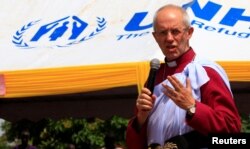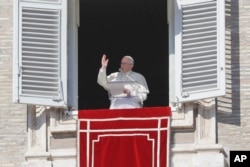Archbishop Josiah Idowu-Fearon, secretary-general of the Anglican consultative council, is appealing to the leaders of South Sudan and the Democratic Republic of the Congo (DRC) to end violence and restore peace.
Idowu-Fearon said the Anglican Communion will join Catholics’ peace efforts on Friday.
“With these countries, No. 1, you will see that, the extent of the loss of lives, the extent of the suffering in these two countries, honestly, it is an embarrassment to Africa in general and the powers that be in the world in particular,” Idowu-Fearon said.
He said the conflict in the two countries is because of power struggle, adding, “It has to do with an epidemic problem on the continent of Africa. ... Tribalism, corruption (and) power.”
The Archbishop of Canterbury Justin Welby, who is the head of the Anglican Church, is also supporting Pope Francis’ call for Friday to be set aside as a day of prayer and fasting for South Sudan and the Democratic Republic of the Congo.
Senior Anglican leaders, including Archbishop Peter Munde, acting primate of the Anglican Church of South Sudan, have endorsed the pope’s call as well.
Pope Francis made the announcement on February 4 in his traditional Angelus address to crowds in St. Peter’s Square in the Vatican.
South Sudan’s conflict began in 2013 as a power struggle between President Salva Kiir and Riek Machar, who was Kiir’s deputy. The war has driven 2 million people from the country and left more than a million others a step away from famine, according to the United Nations.
“What we expect our bishops to do in their various provinces is to get their clergy and inform them with the updates on the situation in South Sudan where millions of people have been displaced [the same in DRC]. The priests will then inform their people [congregations],” Idowu-Fearon said.
Idowu-Fearon, the former bishop of Kaduna Diocese and the archbishop of the Kaduna province in the Church of Nigeria, said the leaders of DRC and South Sudan should put the interests of their people first.
“I will appeal to them just as my archbishop has been doing, the pope himself has been doing and some of the church leaders: Please come together. Agree on how to share power, get this country moving,” he added.
Catholic activists called for protests after Sunday worship last month in DRC, one year after President Joseph Kabila committed to holding an election to choose his successor by the end of 2017 — an election that still hasn’t been held.
The delay has fueled suspicions that Kabila will try to remove constitutional term limits that forbid him to run again, as presidents in neighboring countries have done.
The pope and Welby were scheduled to visit South Sudan in March last year, but the Vatican postponed the visit, citing security and logistical barriers.








